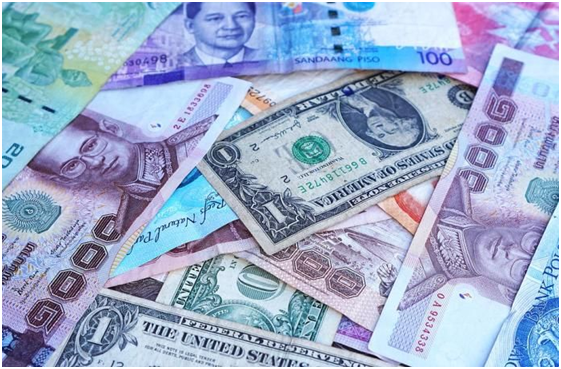
Due to the recent strengthening of the US dollar index, the currencies of many countries have fallen significantly, among which the performance of Asian currencies represented by the Japanese yen and the Korean won is particularly noteworthy. In the face of the adverse situation, many Asian countries represented by China, Japan and South Korea to rescue foreign exchange, although the market exchange rate has temporarily corrected, but some experts said that the strong dollar is taking away capital from emerging economies, which has a particularly severe impact on Asian countries.
First of all, from the economic perspective, the impact of currency depreciation on Asian countries is mainly reflected in the following aspects:
Trade impact: Currency depreciation reduces the value of the domestic currency relative to other currencies, which in turn increases the price competitiveness of exports. This is good news for Asia, where exports are the main pillar of the economy. However, this could also lead to an increase in the cost of imports, which would have an impact on the domestic price level.
Investment impact: Currency depreciation can trigger capital outflows as foreign investors may move their money to more profitable markets. That could cause Asian countries to run out of money, which could affect economic growth. In addition, currency depreciation may also affect the investment decisions of multinational companies, as they may reassess the return on investment in Asian countries.
Debt impact: For Asian countries, currency depreciation means a higher burden of dollar-denominated debt. This could lead to a downgrade in the country's credit rating, which in turn would increase financing costs. This could be a serious problem for countries already facing high debt burdens.

Secondly, from a social perspective, the impact of currency depreciation on Asian countries cannot be ignored:
Rising prices: A depreciating currency can make imported goods more expensive, which in turn pushes up the domestic price level. This will have a negative impact on the lives of ordinary people, especially those with low incomes. They may need to pay a higher cost of living without a corresponding increase in income levels.
Employment pressure: The devaluation of the currency may cause some export enterprises to face difficulties, as their products become less price competitive in the international market. That could lead companies to lay off workers or close factories, adding to employment pressures. This could be a serious problem for regions that rely on export industries.
Social stability: Currency devaluation can trigger social discontent, as ordinary people may feel that the cost of living has risen without increasing income levels. This could lead to an increase in social instability, such as protests and demonstrations.
Finally, from a political perspective, currency depreciation may also have an impact on the political stability of Asian countries:
Lower trust in government: If the government is unable to effectively deal with the economic problems caused by the devaluation of the currency, then its trust may decline. This could lead to increased voter dissatisfaction with the government, which could affect political stability.
Diplomatic tensions: Currency devaluation can trigger trade disputes and frictions with other countries. For example, some countries may take measures to protect their industries from the impact of currency depreciation, triggering a trade war or trade dispute. This will have a negative impact on the foreign relations of Asian countries.
It can be said that the impact of recent currency devaluations on Asian countries is complex and widespread. In order to meet this challenge, Asian countries, especially major economies such as China, Japan and the ROK, need to strengthen policy coordination, promote economic restructuring, and strengthen international cooperation to maintain financial market stability and healthy economic development.

報告顯示,中國電力投資加速增長,預計2024年電網基建投資將超過5300億元。
近日,市場迎來了一則引人注目的消息:工業巨頭3M公司(MMM.N)在本周五公布了其季度業績報告,隨後股價飆升至近兩年來的
最近,外媒給OpenAI算了筆賬,今年可能要血虧50億美元。
近日,巴黎奧運會和世界鐵人三項協會聯合發布了一項重大決定,宣布因塞納河水質污染問題,原定於近期進行的奧運會鐵人三項首次下
當地時間7月18日,法國巴黎發生了一起令人震驚的持刀襲警事件。
近期,一則重大消息在國際舞臺上引起軒然大波,馬來西亞宣布加入金磚國家。
調查發現,互聯網和智能手機的使用幹擾了韓國近五分之一學生的生活。